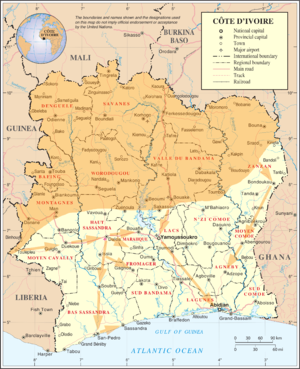Second Ivorian Civil War
| Second Ivorian Civil War | |||||||
|---|---|---|---|---|---|---|---|
 Map of the March 2011 Republican Forces (RFCI) offensive. Territory held by the RFCI prior to March 2011 is shown in orange. |
|||||||
|
|||||||
| Belligerents | |||||||
|
|
|
||||||
| Commanders and leaders | |||||||
|
(Captured after war's end) |
|
||||||
| Strength | |||||||
| Unknown | Unknown (New Forces) 10,000 (United Nations) |
||||||
| Casualties and losses | |||||||
| 44–61 security forces killed (before March) | 50+ killed (RDR) 2 killed (NF) 2 killed (UNOCI) (before March) |
||||||
| 3,000 killed overall | |||||||
The Second Ivorian Civil War broke out in March 2011 when the crisis in Ivory Coast escalated into full-scale military conflict between forces loyal to Laurent Gbagbo, the President of Ivory Coast since 2000, and supporters of the internationally recognised president-elect Alassane Ouattara. After months of unsuccessful negotiations and sporadic violence between supporters of the two sides, the crisis entered a critical stage as Ouattara's forces seized control of most of the country with the help of the UNO, with Gbagbo entrenched in Abidjan, the country's largest city. International organizations have reported numerous instances of human rights violations by both sides, in particular in the city of Duékoué where Ouattara's forces killed more than 3000. The UN and French forces took military action, with the stated objective to protect their forces and civilians. France's forces arrested Gbagbo at his residence on 11 April 2011.
A civil war was fought in Ivory Coast between 2002–04 between the incumbent President Laurent Gbagbo and the rebel Forces Nouvelles de Côte d'Ivoire (New Forces), representing Muslim northerners who felt that they were being discriminated against by the politically dominant and mostly Christian southerners.
In 2002 France sent its troops to Ivory Coast (Operation Unicorn) as peacekeepers. In February 2004 the United Nations established the United Nations Operation in Côte d'Ivoire (UNOCI) "to facilitate the implementation by the Ivorian parties of the peace agreement signed by them in January 2003". Most of the fighting ended by late 2004, with the country split between a rebel-held north and a government-held south. In March 2007 the two sides signed an agreement to hold fresh elections, though they ended up being delayed until 2010, five years after Gbagbo's term of office was supposed to have expired.
After northern candidate Alassane Ouattara was declared the victor of the 2010 Ivorian presidential election by the country's Independent Electoral Commission (CEI), the President of the Constitutional Council – an ally of Gbagbo – declared the results to be invalid and that Gbagbo was the winner. Both Gbagbo and Ouattara claimed victory and took the presidential oath of office.
...
Wikipedia
